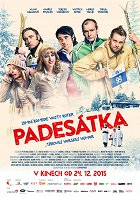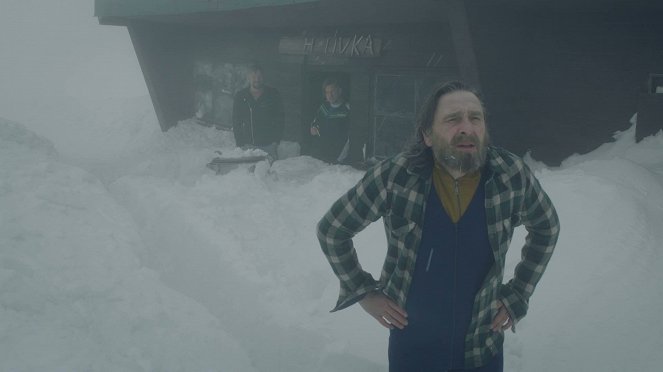Regie:
Vojtěch KotekDrehbuch:
Petr KolečkoKamera:
Tomáš SyselBesetzung:
Ondřej Pavelka, Marek Taclík, Jakub Prachař, Vilma Cibulková, Jiří Schmitzer, Tereza Ramba, Anna Kameníková, Eliška Křenková, Jiří Mádl, Vojtěch Kotek (mehr)Streaming (1)
Inhalte(1)
The annual Fifty KM Cross-country Ski Race is upon us again. Pavka is the oldest living member of a family of cross-country skiers; his father broke his pole during the 50 km race and still finished eleventh. Pavka himself had his son Jura born on Mount Sněžka so that he'd oxygenate quickly. Now this son is not living up to his destiny. Instead of cross-country skiing, he's pursuing a completely different 50; he's addicted to seducing mature women. Jura probably won't finish the race again, but he's got a personal goal to fulfill among the snowy world of mountain cottages. (Zlín Film Festival)
(mehr)Kritiken (3)
Thank God for the youngbloods of Czech cinema, who are not afraid to go beyond the boundaries of good taste, to break with narrative conventions and to step out of restrictive genre pigeonholes. Kotek’s way of telling a story does not in any way conceal the fact that Chasing Fifty is based on a stage play of the same name. He goes against the trend of increasingly frenetic entertainment, instead basing most of the film on a conversation between three men in a single mountain cottage. We learn everything we need to know from the words that we hear. Vilma Cibulková’s parallel trip to the aforementioned cottage ingeniously raises the false expectation that the two storylines will be more tightly intertwined and continuously complement each other. Instead, they come together only at the end, so that the individual stages of the woman’s journey end up being only distracting red herrings. Similarly, the flashbacks – in which there are very unconventional (almost avant-garde) temporal relationships – do not coalesce into a coherent whole, but serve mainly as a redundant illustration of what we hear. This is an inspiring example of hypermediation, in which the old medium does not merge with the new, but comes to the fore (theatrical rigidity, a transparent attempt to keep the characters in an enclosed space for as long as possible, the doubling of a single message by depicting it in both words and images). The film’s creators take an obliging approach to the scattered attention of television viewers by giving preference to a sitcom-style plot composed of loosely connected gags over a more cohesive causal interconnectedness. Thanks to its disregard for narrative logic and rejection of any consistency in the characters’ actions, the film is enjoyably unpredictable. Another unexpected aspect is the abrupt changes in tone along the lines of the “anything goes” approach of modern eclectic artists. The filmmakers are not afraid to cross the high with the low, laughter with tears, blood with semen. Humorous scenes reminiscent of animated slapstick – including the Mickey Mousing that another progressive Czech filmmaker, Zdeněk Troška, likes to use – are juxtaposed with, for example, a scene in which one of the characters has his skull punctured and his leg stabbed (so badly that he loses it). Kotek and Koleček also refused to give in to the unwritten demand for a more sensitive portrayal of a bygone era that would not turn normalisation into an ostalgic open-air museum of crazy hairstyles, knitted sweaters, tight trousers and Polish condom vending machines. For them, the Communist era is only about the surface, because dealing with politics in the post-modern era without grand narratives is passé anyway. The playful caricature of normalisation corresponds to the film’s concept of itself as a self-assured generational manifesto that ridicules the past regime and adults – the older characters are either hysterical and clumsy (Kateřina), pedantic, heartless and inconsiderate (Pavko) or an outright psychopath who “reads” animal entrails instead of newspapers (Kuna). Both the younger and older characters are defined by a single characteristic, in that they are one-dimensional types, which fits well with the exaggeratedly comedic tone of some scenes and contrasts nicely with the attempt at nostalgically touching tragedy found in other scenes. However, I consider the film’s consistent antifeminism to be its most daring departure from the dominant current of contemporary genre cinema. Chasing Fifty is subversive in its conservative chauvinism, its guyish “highlander” humour about women, homosexuals (who drink cranberry juice) and the disabled. There is not a single positive, let alone active female character who acts of her own accord (rather than out of a desire to please men). Rather, the women in the film are lustful sexualised objects who can be happy that someone wants to have sex with them (and thus drive their sadness out of their bodies). In the deluge of films celebrating the awakening of female power, this is truly very refreshing. I look forward to seeing what the promising screenwriter, who has previously shown an extraordinary understanding of the female spirit (Icing), will surprise us with next. I am equally curious as to how Kotek will further develop the humorous motifs from the film that made him an idle to teenage girls (in comparison with Snowboarders, Chasing Fifty is different in that, for example, sex sometimes leads to the conception of a child, so the characters don’t just figure out who slept with whom, but also who is whose son/father/brother).
()
(weniger)
(mehr)
I have to admit, I was a bit afraid of Petr Kolečko in charge of the screenplay. When he wrote something on his own, it was never quite right (Fishy If There Are No Fish, Marta and Věra), but this movie completely changed my opinion. Chasing Fifty is amazing! Maybe it is a bit dirtier than usual in comedies, but it is still within the lines of being acceptable. And there is nothing easier than blame everything on the mountains. I would have done the same. I was pleased by both a crazy story, which towards the ending was resembling a rough drama rather than a comedy, and also amazing actors. For example, Ondřej Pavelka’s role really agreed with him. On the other hand, I could not agree with the reviews on this site of the lesser people who completely damned the movie even before it arrived in cinemas. They are clearly some pimpled asocial people, who cannot stand it when the humor gets a bit rough. It is rough here and it is fucking classy!
()
Es lohnt sich, ins Theater Rubín zu gehen und die Stücke von Petr Kolečko anzuschauen, weil diese so erfolgreich sind, dass dann auf ihrer Basis Filme gedreht werden. Im Unterschied zu Icing habe ich mir das Stück im Theater nicht angeschaut, also habe ich keinen Vergleich. Bei Debüts drücke ich immer die Augen zu, doch bei Chasing Fifty habe ich ein Problem damit, mehr als drei Sterne zu vergeben. Am meisten verweisen würde ich auf die fehlende genremäßige Verankerung, als reine Komödie würde ich den Film nicht mal ansatzweise bezeichnen, es wird viel zu viel zusammengewürfelt. Ich gebe zu, dass ich mehrmals gelacht habe, aber ich musste auch einige Male den Kopf schütteln, so hat sich beispielsweise das komödiantische Potenzial von Pavla Tomicová in den Snowboarders erschöpft, Juras Deviation war inkorrekt, und da gehöre ich nicht zu den zugeknöpften Zuschauern. Andererseits sieht an an der Generation Mádl, Kotek, Hádek, Voříšková und Křenková nur zu gut, dass sie wohl wirklich gern zusammen spielen, und auch die Musikauswahl ist gelungen. Und abschließend braucht man nur Pavelka zu sagen - der strahlt im Theater Rubín gleich in mehreren Stücken.
()

